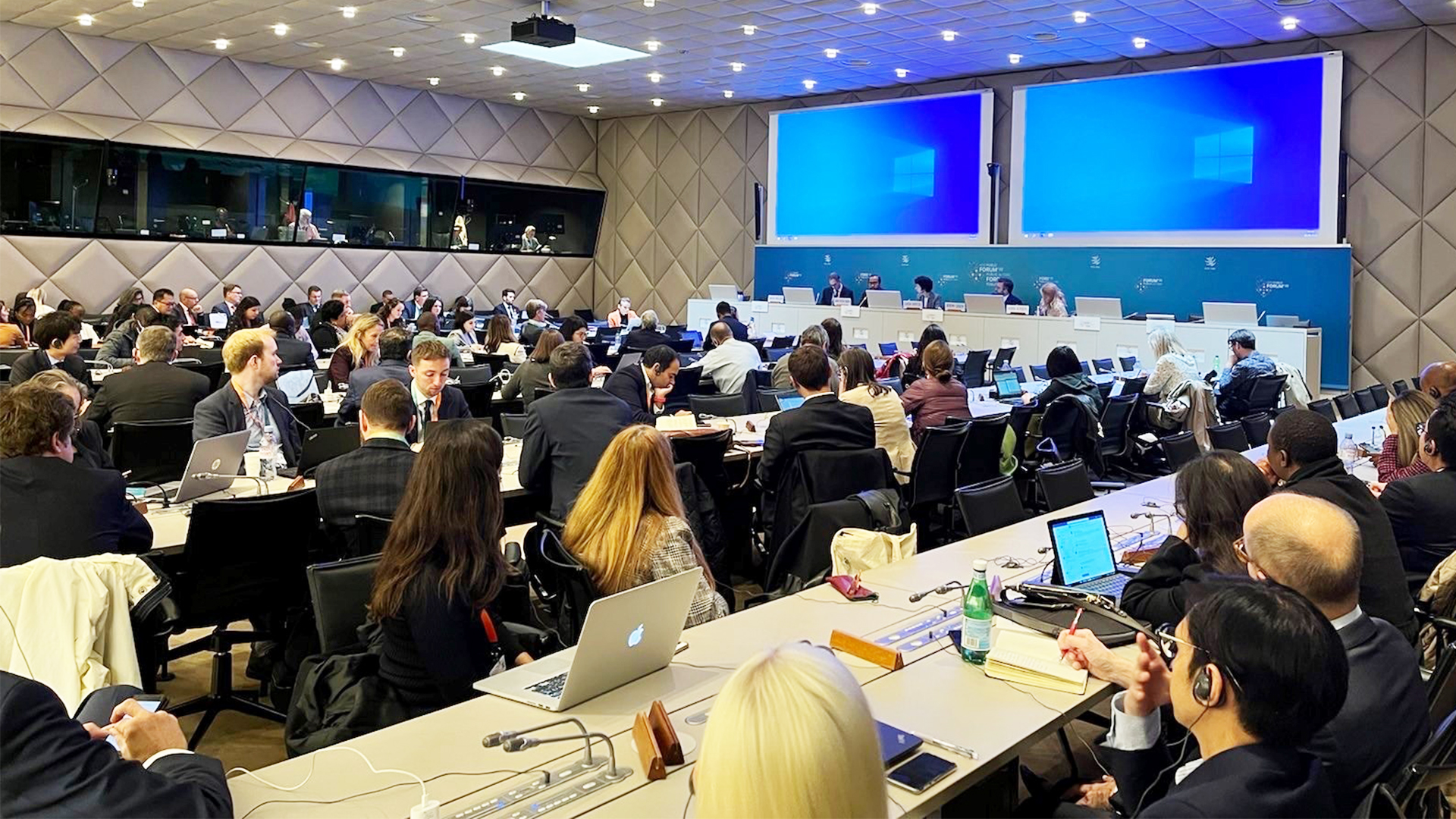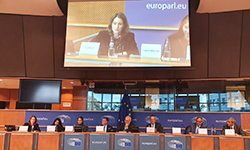BusinessEurope Headlines No. 2022-28
WTO Public Forum: an opportunity to discuss key priorities

On the occasion of the WTO Public Forum taking place this week in Geneva, BusinessEurope organised a mission to support the World Trade Organisation and help maintain the momentum that followed the 12th WTO Ministerial Conference, which took place in June.
A series of meetings with high-level officials and WTO member representatives were organised, giving BusinessEurope and members that were present in Geneva an opportunity to discuss our key priorities, including the reform of the WTO and the resolution of the Appellate Body crisis in particular, as well as e-commerce and discussions around the TRIPs (Trade-Related Aspects of Intellectual Property Rights) waiver. On this latter topic, please read our most recent letter addressed to the European Commission. Luisa Santos, BusinessEurope’s Deputy Director General, also joined a working session organised by Institut Veblen, having the opportunity to discuss about the EU legislative agenda in the context of the Green Deal and beyond, and how measures related to the process and production method of goods may have an impact on trade.
Finally, BusinessEurope organised a successful working session dedicated to promoting sustainable and inclusive solutions in the area of digital trade, where participants discussed the role of the WTO in developing modern rules in this area – from multilateral solutions, such as a permanent e-commerce moratorium, to plurilateral solutions, such as the e-commerce Joint Statement Initiative. The COVID-19 pandemic showcased how digital trade can provide solutions and opportunities. At the same time, it also underlined an increasing digital divide. To respond to this challenge, panellists agreed that rules are critically important on how we conduct digital trade, including issues such as data flows, but also consumer protection. In this respect, they underlined that the WTO setup is not preventing governments to legislate, especially in areas of public interest. The input of stakeholders, including businesses, is important to help the WTO pursue fact-based discussions and deliver concrete solutions.
![]() Contacts: Bournou Sofia, Elena Suárez
Contacts: Bournou Sofia, Elena Suárez
Our comment
The Data Act must enable Europe’s industrial competitiveness
By Svetlana Stoilova, Adviser for Internal Market
 As horizontal legislation, the Data Act will have an impact not only on the entire data economy, but also on manufacturers of smart objects and service providers across the board. Industries and businesses of all sizes, regardless of the given exemptions, will feel the repercussions of this comprehensive legislation. Furthermore, since it will enable more data sharing, more storage and processing capabilities will be needed. As much as this would bring optimisation, efficiency gains and innovation opportunities for the economic actors, it could also entail increased energy consumption and cybersecurity risks. BusinessEurope believes that the Data Act could enable growth, and increase Europe’s competitiveness, and there are several elements to be considered, so there is no chilling effect on investments nor on innovation:
As horizontal legislation, the Data Act will have an impact not only on the entire data economy, but also on manufacturers of smart objects and service providers across the board. Industries and businesses of all sizes, regardless of the given exemptions, will feel the repercussions of this comprehensive legislation. Furthermore, since it will enable more data sharing, more storage and processing capabilities will be needed. As much as this would bring optimisation, efficiency gains and innovation opportunities for the economic actors, it could also entail increased energy consumption and cybersecurity risks. BusinessEurope believes that the Data Act could enable growth, and increase Europe’s competitiveness, and there are several elements to be considered, so there is no chilling effect on investments nor on innovation:
- Consistency with other legislation, especially the Trade Secrets Directive, GDPR, and Database Directive;
- Preserving contractual freedom, adequate compensation, and freedom to define value proposition;
- Narrowing down the possibilities for business-to-government data access requests.
Business-to-business data-sharing culture relies on commercially viable cooperation between enterprises. Among stakeholders who replied to the public consultation for the Data Act proposal, 68% confirmed that they already share data with other companies, which means that the data-sharing culture of Europe already exists. The proposal must nurture it further, rather than hampering it with uncertainty. To this end, the protection of trade secrets, sensitive commercial information, personal data, and databases must not be lowered. This way the businesses would continue investing in the creation of smart products and services, more data generation, more accurate data analytics, and innovative and efficient data processing capabilities.
The Data Act could give a further boost to this data-sharing culture by preserving and strengthening the contractual freedom businesses enjoy. Businesses and customers/users must continue to be able to decide how data sharing should take place, what underlying solutions are used, how to adapt to the business models of the contracting parties, etc. Furthermore, the presumption of the proposal seems to be that data and digital services are downstream operations, rather than being the focus of integrated performance and value proposition in industrial applications. Therefore, enabling the flow of data from aftermarket service providers to product manufacturers could increase the reciprocity in data sharing and the collaboration among businesses. This ultimately will provide better value for the users. Important additional elements in support of the above are the adequate compensation for making data available and the clear enforceable obligations for third parties receiving data.
As regards to business-to-government data sharing, we highlight that during the recent years, companies in the EU have demonstrated that they actively engage in data-sharing initiatives with authorities in order to address the negative consequences of crises. Businesses understand and assume their societal role when emergencies occur, in many cases proactively looking for cooperation with authorities. While more clarity for a legal basis in cases of public emergencies limited in time and scope could be helpful to frame the B2G data sharing requests, the obligation to make data available when there is a non-urgent “exceptional need” is problematic. The scope of this circumstance can end up being widely interpreted. Business data access requests coming from the many public sector bodies across the EU could become the norm rather than the exception. Therefore, business-to-government data sharing must be carefully balanced with democratic rights and democratic accountability.
More details on BusinessEurope’s position on the Data Act can be found here.
![]() Contact: Svetlana Stoilova
Contact: Svetlana Stoilova
EU business urgently calls on tackling skyrocketing energy prices
 The critical situation on the European energy market and exorbitant energy prices is increasingly impacting millions of European households and businesses. With price hikes coming to double or even triple digits, skyrocketing energy bills have a direct impact on the business viability in Europe and the whole economy. The current state of high gas and electricity prices bears the imminent risk of production losses and shutdowns of thousands of European companies. Urgently finding ways at EU level to mitigate the impact of crippling energy prices faced by European business is a matter of survival, BusinessEurope wrote in a letter to European Commission President Ursula von der Leyen, European Council President Charles Michel, and the Czech Presidency of the Council of the EU ahead of the Extraordinary Energy Council meeting on 30 September.
The critical situation on the European energy market and exorbitant energy prices is increasingly impacting millions of European households and businesses. With price hikes coming to double or even triple digits, skyrocketing energy bills have a direct impact on the business viability in Europe and the whole economy. The current state of high gas and electricity prices bears the imminent risk of production losses and shutdowns of thousands of European companies. Urgently finding ways at EU level to mitigate the impact of crippling energy prices faced by European business is a matter of survival, BusinessEurope wrote in a letter to European Commission President Ursula von der Leyen, European Council President Charles Michel, and the Czech Presidency of the Council of the EU ahead of the Extraordinary Energy Council meeting on 30 September.
![]() Contact: Alexandre Affre
Contact: Alexandre Affre
Key messages to EU Competitiveness Council
 EU ministers responsible for competitiveness met on 29 September to discuss a few legislative initiatives of the European Commission . The policy debates focused on the new proposal for a Single Market Emergency Instrument (SMEI) and the Ecodesign for Sustainable Products Regulation (ESPR). BusinessEurope is actively following both legislative initiatives which have far-reaching implications on businesses. While the objectives of the proposals may be good, they have significant shortcomings that need to be addressed urgently. BusinessEurope stands ready to discuss the necessary improvements, and our key concerns were summarised for the EU ministers in our letter to the EU Council Presidency and the Member States.
EU ministers responsible for competitiveness met on 29 September to discuss a few legislative initiatives of the European Commission . The policy debates focused on the new proposal for a Single Market Emergency Instrument (SMEI) and the Ecodesign for Sustainable Products Regulation (ESPR). BusinessEurope is actively following both legislative initiatives which have far-reaching implications on businesses. While the objectives of the proposals may be good, they have significant shortcomings that need to be addressed urgently. BusinessEurope stands ready to discuss the necessary improvements, and our key concerns were summarised for the EU ministers in our letter to the EU Council Presidency and the Member States.
![]() Contact: Martynas Barysas
Contact: Martynas Barysas
Businesses call for a modernised trade deal with Morocco
 “In the current context of supply chain disruptions and geopolitical instability, many companies are looking for ways to diversify their supply chains to become more resilient to future crisis. Due to its geographic proximity to the EU and the close economic ties we already have, Morocco could be a natural choice in this regard”, said Eleonora Catella, Deputy Director at the International Relations Department of BusinessEurope, at the conference “EU-Morocco Cooperation & Trade for Sustainability in the Mediterranean”. The event, which was co-organised by the S&D and EPP Groups as well as the General Confederation of Moroccan Enterprises (CGEM), took place in the European Parliament on 28 September 2022. It brought together representatives of the European and Moroccan Parliaments as well as the business communities from both sides to discuss the opportunities linked to closer cooperation in the Mediterranean region amidst growing uncertainty. “However, the EU-Morocco Association Agreement entered into force in 2000 and no longer reflects the complexity of our economic relations. In order to maximise the potential for closer cooperation between the EU and Morocco, we should thus take the necessary steps to modernise our trade deal”, Catella added.
“In the current context of supply chain disruptions and geopolitical instability, many companies are looking for ways to diversify their supply chains to become more resilient to future crisis. Due to its geographic proximity to the EU and the close economic ties we already have, Morocco could be a natural choice in this regard”, said Eleonora Catella, Deputy Director at the International Relations Department of BusinessEurope, at the conference “EU-Morocco Cooperation & Trade for Sustainability in the Mediterranean”. The event, which was co-organised by the S&D and EPP Groups as well as the General Confederation of Moroccan Enterprises (CGEM), took place in the European Parliament on 28 September 2022. It brought together representatives of the European and Moroccan Parliaments as well as the business communities from both sides to discuss the opportunities linked to closer cooperation in the Mediterranean region amidst growing uncertainty. “However, the EU-Morocco Association Agreement entered into force in 2000 and no longer reflects the complexity of our economic relations. In order to maximise the potential for closer cooperation between the EU and Morocco, we should thus take the necessary steps to modernise our trade deal”, Catella added.
Contact: Benedikt Wiedenhofer
Contribution to the reform of the EU Union Customs Code
 On 16 September, BusinessEurope submitted its input to the European Commission’s public consultation and call for evidence on the revision of the Union Customs Code (UCC). This reform is a timely and excellent opportunity to modernise EU customs, to stay fit for purpose in a rapidly changing international trade environment facing multiple challenges. The modernisation of EU customs should help harmonise the application of the UCC across Member States and restore the balance between customs obligations and simplifications for business. Modern and forward-looking solutions to facilitate legitimate trade, implement simplifications, reduce bureaucracy and digitalise customs are of key importance, especially at a time when global supply chains are under significant strain. These and other points were included in BusinessEurope’s input. The reform of the UCC happens roughly every 10 years and it is important that we get it right now and don’t miss this opportunity. We count on the Commission to fully take the comments from business into account. At the end of the day, economic operators will be putting the legislation into practice and business can make valuable contributions given their hands-on knowledge and experience on customs processes.
On 16 September, BusinessEurope submitted its input to the European Commission’s public consultation and call for evidence on the revision of the Union Customs Code (UCC). This reform is a timely and excellent opportunity to modernise EU customs, to stay fit for purpose in a rapidly changing international trade environment facing multiple challenges. The modernisation of EU customs should help harmonise the application of the UCC across Member States and restore the balance between customs obligations and simplifications for business. Modern and forward-looking solutions to facilitate legitimate trade, implement simplifications, reduce bureaucracy and digitalise customs are of key importance, especially at a time when global supply chains are under significant strain. These and other points were included in BusinessEurope’s input. The reform of the UCC happens roughly every 10 years and it is important that we get it right now and don’t miss this opportunity. We count on the Commission to fully take the comments from business into account. At the end of the day, economic operators will be putting the legislation into practice and business can make valuable contributions given their hands-on knowledge and experience on customs processes.
![]() Contact: Elena Suárez
Contact: Elena Suárez
Calendar 
- 3-4 October: The Europe of Tomorrow: Gender Equality and the Economy
- 10-11 October: Tallinn Digital Summit 2022
- 12-14 October: European Forum for New Ideas 2022
- 7-18 November: United Nations Climate Change Conference 2022 (UNFCCC COP 27)
Not yet a subscriber? Register here.
Reminder: please have a look at our privacy policy